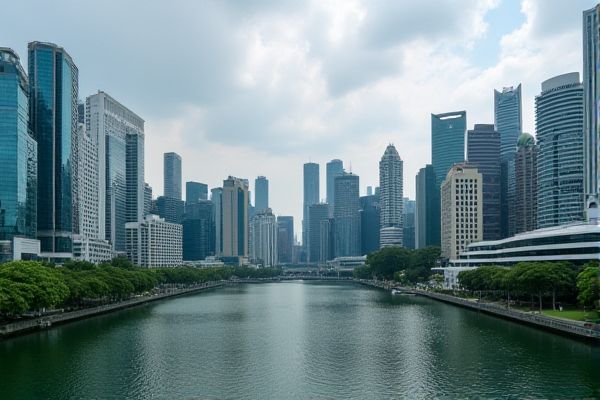
Healthcare facilities in Singapore: Comprehensive public and private healthcare system. World-class medical infrastructure. Universal healthcare through Medisave, Medishield, and Medifund. Numerous specialty clinics and hospitals. Highly trained healthcare professionals. Accredited JCI and ISO-certified facilities. Accessible 24-hour emergency services. Advanced medical technology and treatments. Extensive health screening programs. High patient satisfaction rates.
Comprehensive public and private healthcare system
Singapore's healthcare system is a mix of public and private facilities, with the public sector managed by the Ministry of Health through three regional clusters. It offers universal coverage through MediShield Life and MediSave, ensuring comprehensive services for its citizens. Meanwhile, the private sector, preferred by expatriates for its better quality and shorter waiting times, operates independently and tends to be more expensive.
World-class medical infrastructure
Singapore boasts world-class medical infrastructure, ranking highly in global health indices, with a comprehensive network of public and private hospitals, alongside numerous specialty centers and community hospitals. This robust system ensures high-quality care and access to advanced medical services, including those from international organizations like Duke University and JCI. For more information on the healthcare landscape in Singapore, you can explore the detailed insights offered by the Country Commercial Guides on Trade.gov.
Universal healthcare through Medisave, Medishield, and Medifund
Singapore's healthcare system provides universal coverage through a mixed financing model that includes Medisave, a compulsory medical savings account, Medishield Life, a basic health insurance plan, and Medifund, which acts as a safety net for those unable to afford medical care. This system ensures that all citizens have access to affordable healthcare, supported by significant government subsidies and involvement from the private sector. For more detailed information, you can visit the HealthHub website where they provide a comprehensive overview of the healthcare costs and financing in Singapore.
Numerous specialty clinics and hospitals
Singapore boasts a well-organized healthcare system with numerous specialty clinics and hospitals, such as 18 acute care hospitals comprised of public, for-profit, and not-for-profit institutions. A network of polyclinics and GP clinics is instrumental in providing primary care and facilitating referrals to specialist outpatient clinics. In addition to these public facilities, private specialist clinics operate across the country, offering a wide range of specialized care services in fields like cardiovascular, cancer, and orthopedic treatments. For more information on Singapore's healthcare framework and its international comparisons, visit the Commonwealth Fund's International Health Policy Center.
Highly trained healthcare professionals
Singapore boasts a well-organized healthcare system with highly trained healthcare professionals, including over 13,766 registered medical practitioners, with nearly two-thirds working in the public sector, and a significant increase in the doctor-to-population ratio. The system is supported by three medical schools, heavily subsidized tuition fees, and mandatory public service for medical graduates, ensuring a skilled workforce. For more detailed insights into the healthcare landscape, the Commonwealth Fund offers valuable information about how Singapore has structured its healthcare system.
Accredited JCI and ISO-certified facilities
Singapore boasts numerous healthcare facilities accredited by the Joint Commission International (JCI) and certified by ISO or OHSAS, ensuring high-quality healthcare and patient safety standards. Notably, there are several JCI-accredited hospitals and medical centers, reflecting the country's commitment to excellence in medical services. For more information on this, you might want to visit the website dedicated to Medical Tourism in Singapore, which offers insights into the top-tier healthcare options available in the nation as of 2023.
Accessible 24-hour emergency services
In Singapore, 24-hour emergency services are widely available through various hospitals and clinics, including Tan Tock Seng Hospital, Alexandra Hospital, and KK Women's and Children's Hospital, as well as private facilities like Raffles Hospital and Ng Teng Fong General Hospital. The Singapore Civil Defence Force (SCDF) also operates a 24-hour Emergency Medical Services (EMS) system accessible via the 995 hotline. For more information on these life-saving services, visit the comprehensive guide on 24-Hour Clinics.
Advanced medical technology and treatments
Singapore's healthcare facilities are heavily integrated with advanced medical technology, including wearable tech for continuous patient monitoring, state-of-the-art imaging devices like MRI and CT scanners, robotic surgical equipment for minimally invasive procedures, and telemedicine devices for remote consultations. These innovations, as detailed on the Singapore Medicare website, enhance diagnosis, treatment, and patient recovery times.
Extensive health screening programs
In Singapore, extensive health screening programs are available through initiatives like the Screen for Life programme, which offers subsidized health screenings for cardiovascular disease, cervical cancer, colorectal cancer, and breast cancer at participating CHAS GP clinics, making early detection and intervention highly accessible and affordable for Singaporeans.
High patient satisfaction rates
In Singapore, high patient satisfaction rates are evident, with 85.9% of respondents rating their overall satisfaction with public healthcare institutions as "excellent" or "good" in the 2015 Patient Satisfaction Survey, and 83.8% indicating that these institutions met or exceeded their expectations.
